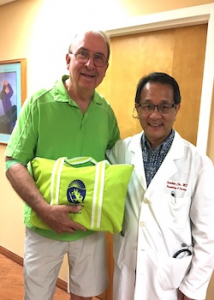
George Stewart noticed his stomach growling an unusual amount. Months passed and the growling continued. His concern grew, which led to him receiving a colonoscopy. The following day, Stewart was diagnosed with colon cancer.
Data from the Hawaiʻi Tumor Registry operated by the University of Hawaiʻi Cancer Center shows that cancer of the colon and rectum are the third most frequently diagnosed cancer in the state, with an average of 710 new cases a year. In recognition of National Colorectal Cancer Awareness Month, the UH Cancer Center recommends getting screened for colorectal cancer starting at age 45, and to talk with your doctor about which screening option is best for you.
UH Cancer Center study: Free resources for colon cancer patients, caregivers
Stewart had to undergo five major surgeries in less than a year. He was seen at the Queen’s Medical Center every day for six months for treatment and procedures, followed by three months of chemotherapy by his oncologist, Jonathan Cho, who is currently the medical director of the UH Cancer Center Clinical Trials Office.
- Related UH News story: UH Cancer Center pushes to raise clinical trial levels back up, December 12, 2022
According to Cho, while there has been a slow but steady decline in the incidence and mortality of colon cancer over the last 15 years, there has been an increase in incidence in the under 50 years age group.
“This is alarming and has led to the recommendation to initiate colon cancer screening at age 45 years,” he said.
“I credit Dr. Cho for saving my life,” Stewart said. “He treated me with respect and dignity when I was the most vulnerable. We were partners in my cancer journey and now we’re friends.”
He added, “I learned I need to be my own advocate and push forward, inquire about other options, get a second opinion, select a medical team that you can work with, and listen to what your body is telling you. Don’t ignore unusual occurrences in your body,” said Stewart. “If you’re reading this, please get screened for colon cancer. It could save your life as it did mine.”
Resources for patients, caregivers

Experiencing the hardships of cancer caregiving first-hand, Stewart and his wife, Jeannie, decided to form a non-profit organization to provide resources for cancer caregivers called Compassion for Cancer Caregivers. The Stewarts are dedicated to providing support for cancer caregivers and ensuring they remember to take care of themselves too.
The UH Cancer Center is also conducting a study, Improving Quality of Life for Colon Cancer Patients and Caregivers, that provides free information and educational resources to help colon cancer patients and their caregivers. To learn more about this study, call (808) 564-3808.

